Overview
We recognize that essential healthcare integration services are crucial for modern systems aiming to enhance patient care and operational efficiency. Our exploration of platforms such as Avato, Mirth Connect, and Clarity Connect underscores their significant roles in facilitating seamless information exchange, improving interoperability, and automating processes. These advancements ultimately lead to better patient outcomes and streamlined healthcare delivery.
What’s holding your team back from achieving these benefits? By leveraging these integration platforms, we can transform challenges into opportunities, ensuring that your organization thrives in an increasingly complex healthcare landscape.
Let’s take the next step together toward a more efficient and effective healthcare system.
Introduction
In the rapidly evolving landscape of healthcare, we recognize that the need for seamless data integration has never been more critical. As organizations strive to enhance patient care and operational efficiency, innovative platforms like Avato, Mirth Connect, and Clarity Connect emerge as essential tools in bridging the gaps between disparate systems.
These integration solutions not only facilitate secure data exchange but also empower healthcare providers to make informed decisions based on real-time information. With the increasing demand for interoperability driven by technological advancements and regulatory requirements, understanding the capabilities of these platforms is vital for any healthcare organization aiming to thrive in the digital age.
This article delves into the transformative impact of these integration solutions, exploring their roles in enhancing patient outcomes and streamlining healthcare operations.
What’s holding your team back from embracing these advancements? We invite you to explore how we can support your journey towards improved healthcare integration.
Avato: Secure Hybrid Integration Platform for Healthcare Systems
At Avato, we understand the critical importance of dedication in the medical field—after all, our name is derived from the Hungarian term for ‘of dedication.’ Our team of enterprise architects is committed to integrating diverse systems and information, ensuring that our hybrid connection platform is meticulously designed to provide secure and efficient links among various systems and information sources. This dedication empowers medical organizations to innovate while complying with stringent regulatory requirements.
With robust architecture that effectively mitigates risks associated with digital transformation, our platform facilitates real-time monitoring and notifications, ensuring that crucial connections remain operational around the clock—essential for both patient care and operational efficiency. The medical sector is undergoing a significant transformation towards healthcare integration services, driven by the urgent need for seamless information exchange and enhanced service delivery.
As the U.S. information unification market is projected to grow at a CAGR of 12.66% from 2025 to 2034, the demand for secure unification solutions has never been more pressing. Successful implementations of hybrid connection platforms, like ours, have demonstrated their ability to simplify complex projects, as evidenced by customer testimonials that highlight timely and budget-conscious results.
The importance of secure unification in medical services has been underscored by the COVID-19 pandemic, which acted as a catalyst for digitalization and subsequently increased budgets for data connection solutions. As organizations transition to new electronic health record (EHR) systems, the necessity of well-planned healthcare integration services cannot be overstated; poorly executed transitions can result in costly delays and clinician dissatisfaction.
At Avato, we distinguish ourselves by ensuring secure connections that facilitate digital transformation in healthcare integration services, ultimately enhancing the quality of care provided to patients. Our platform liberates isolated assets, enabling medical organizations to utilize their information effectively and achieve superior outcomes.
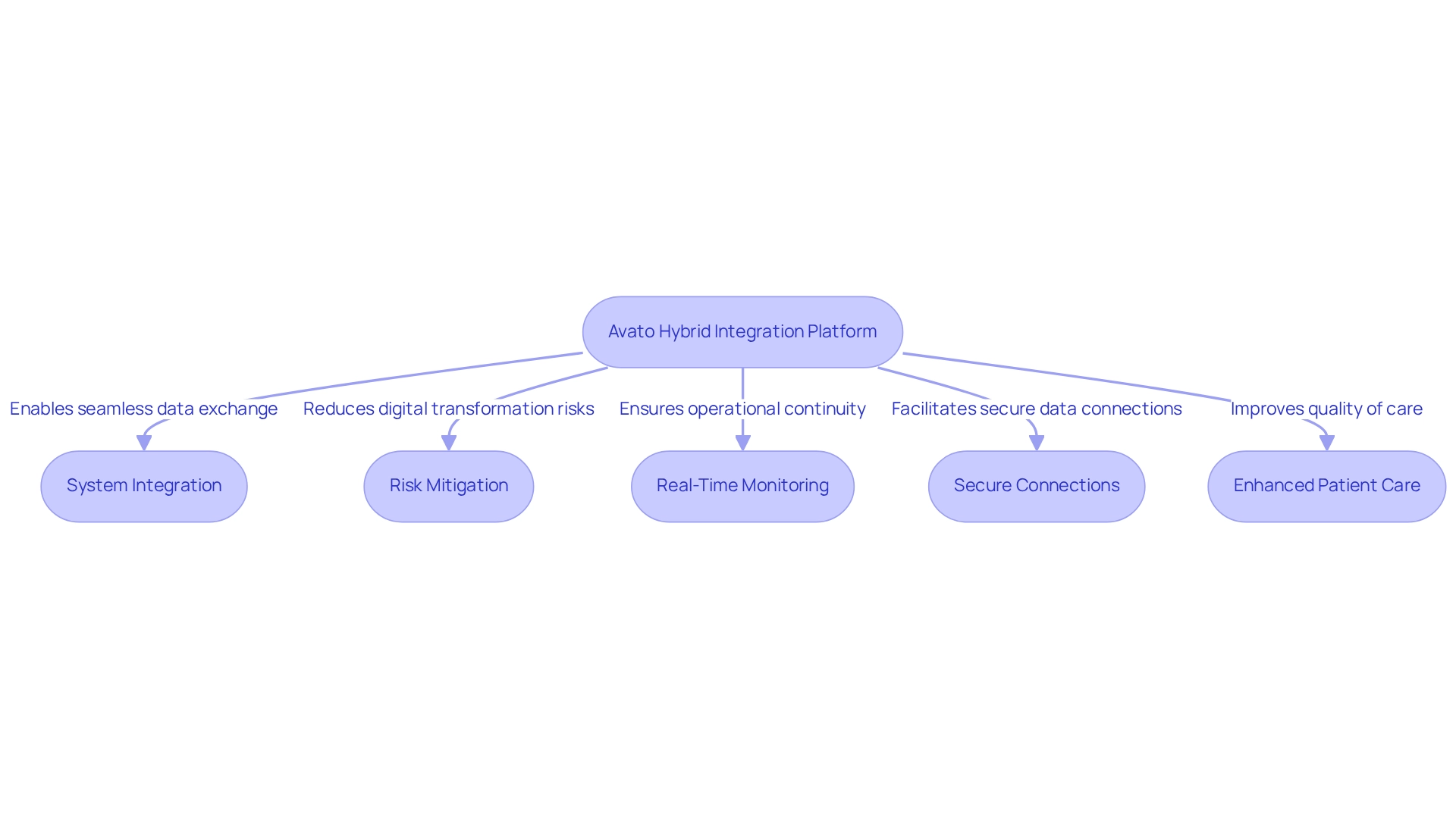
Mirth Connect: Streamlining Healthcare Interoperability
Mirth Connect is not just an open-source connection engine; it is a vital tool that empowers medical organizations to facilitate seamless information exchange through healthcare integration services across diverse systems. By supporting critical information formats like HL7 and FHIR, we significantly enhance interoperability, which is essential for effective patient information management and streamlined clinical workflows.
Our platform’s user-friendly interface, paired with robust functionality, positions us as the preferred solution for medical providers seeking to optimize their connection processes. Notably, Mirth Connect enables real-time observation and notification, crucial for maintaining system efficiency and ensuring uninterrupted service delivery.
As the medical field evolves, the adoption of standards such as FHIR is increasingly important. FHIR delineates how health information should be organized and structured for sharing across various computer systems, reducing the risk of misinterpretation and improving accuracy. This shift toward standardized information exchange is evident in the growing utilization of healthcare integration services, such as Mirth Connect, which has become indispensable in implementing effective information exchange across varied medical environments.
Experts underscore the importance of healthcare integration services like Mirth Connect in addressing the rising costs of medical services. As R. Gazzarata notes, digital medical ecosystems have emerged to confront these expenses, and solutions like ours not only reduce connection costs but also foster innovation, enabling medical organizations to adapt swiftly to changing demands. With the global AI in medical services market projected to reach USD 238.5 billion by 2032, the role of integration engines in supporting advanced technologies, including AI and VR, is more critical than ever in humanizing care and enhancing data accessibility.
In conclusion, Mirth Connect stands out as a key player in the medical interoperability landscape, driving improvements in clinical workflows and empowering organizations to achieve their integration goals efficiently. We invite you to explore how Mirth Connect can transform your information exchange processes.
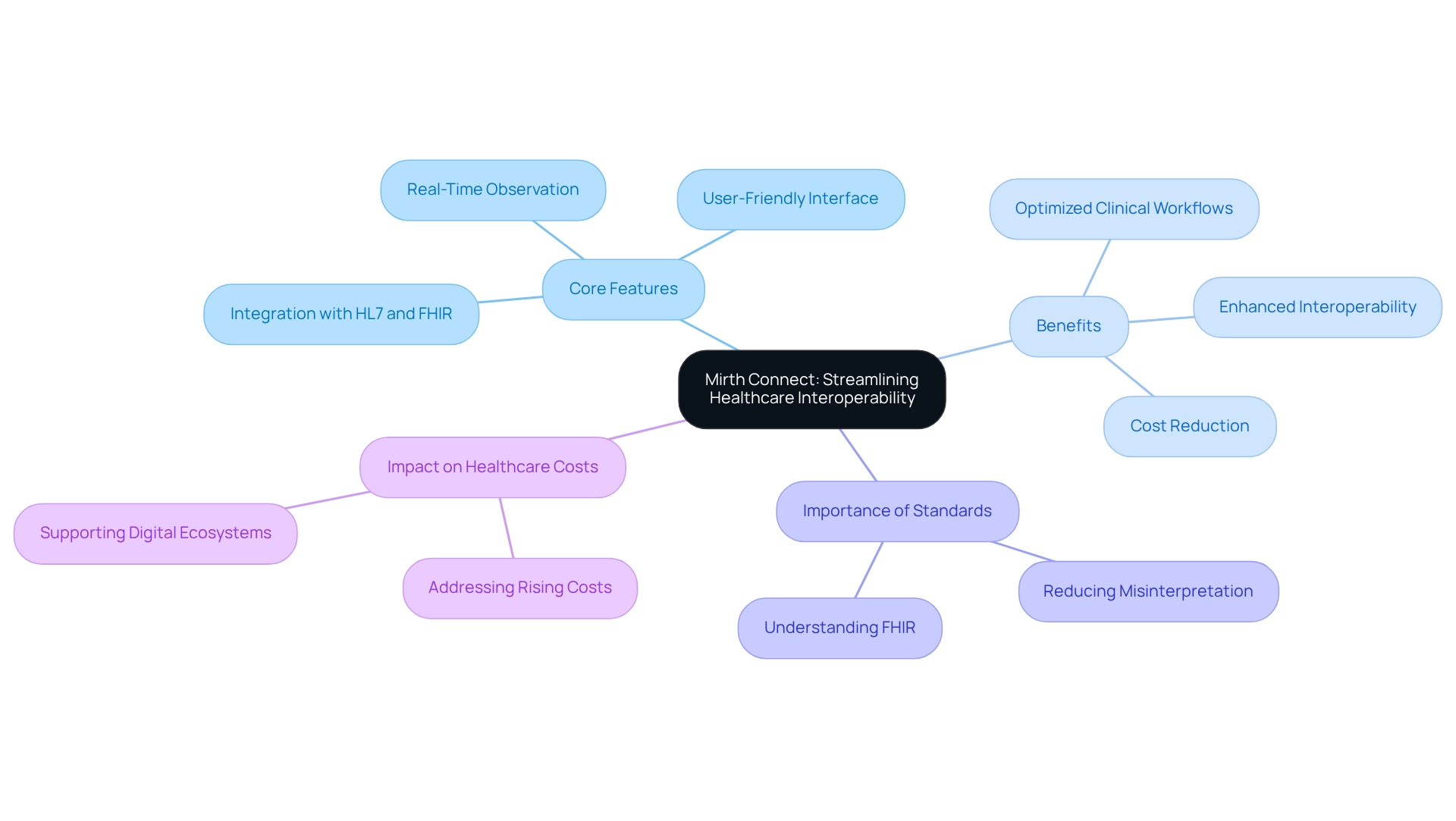
Clarity Connect: Automating EMR/EHR Integration for Enhanced Patient Care
At Clarity Connect, we excel in automating the merging of EMR and EHR systems, a critical advancement for enhancing care by providing our medical professionals with timely access to precise information about individuals. In 2025, statistics indicate that automated EMR/EHR unification can reduce manual entry errors by up to 30%, significantly streamlining clinical workflows (source: Statista). This allows us to allocate more time to patient care instead of administrative duties.
Our platform’s seamless integration capabilities ensure effective communication across all systems, which is essential for enhancing medical service delivery. A recent survey revealed that 65% of independent physicians expressed dissatisfaction with their current EHR systems, citing usability and interoperability issues (source: Tebra). We address these challenges by facilitating smoother information flows, ultimately leading to better care coordination and reduced medical mistakes.
Furthermore, our influence on care for individuals is underscored by our capacity to automate medical information flows, improving the precision and accessibility of individual details. By utilizing XSLT for XML information transformation, we minimize programming errors and decrease the labor involved in manipulation, leading to substantial cost savings and enhanced performance. As medical services continue to advance, the advantages of automating EMR/EHR integration become increasingly apparent. Specialists observe that such automation is essential for creating personalized treatment plans and enhancing outcomes for individuals. Additionally, AI plays a significant role in supporting our medical professionals in developing unique treatment plans based on extensive individual data.
In 2025, the emphasis on automating medical workflows is more crucial than ever, as organizations strive to enhance their operations while ensuring top-notch care for individuals. We stand out as a leader in this field by providing innovative healthcare integration services that enhance integration and support the overall objectives of contemporary medical systems. Furthermore, our strategic partnership with Red Hat enhances these capabilities through enterprise open-source solutions, ensuring robust support and performance. As Gustavo Estrada noted, “Avato has the ability to simplify complex projects and deliver results within desired time frames and budget constraints.” Continuous research is essential to assess the long-term effects of EHRs on care and identify optimal practices for implementation.
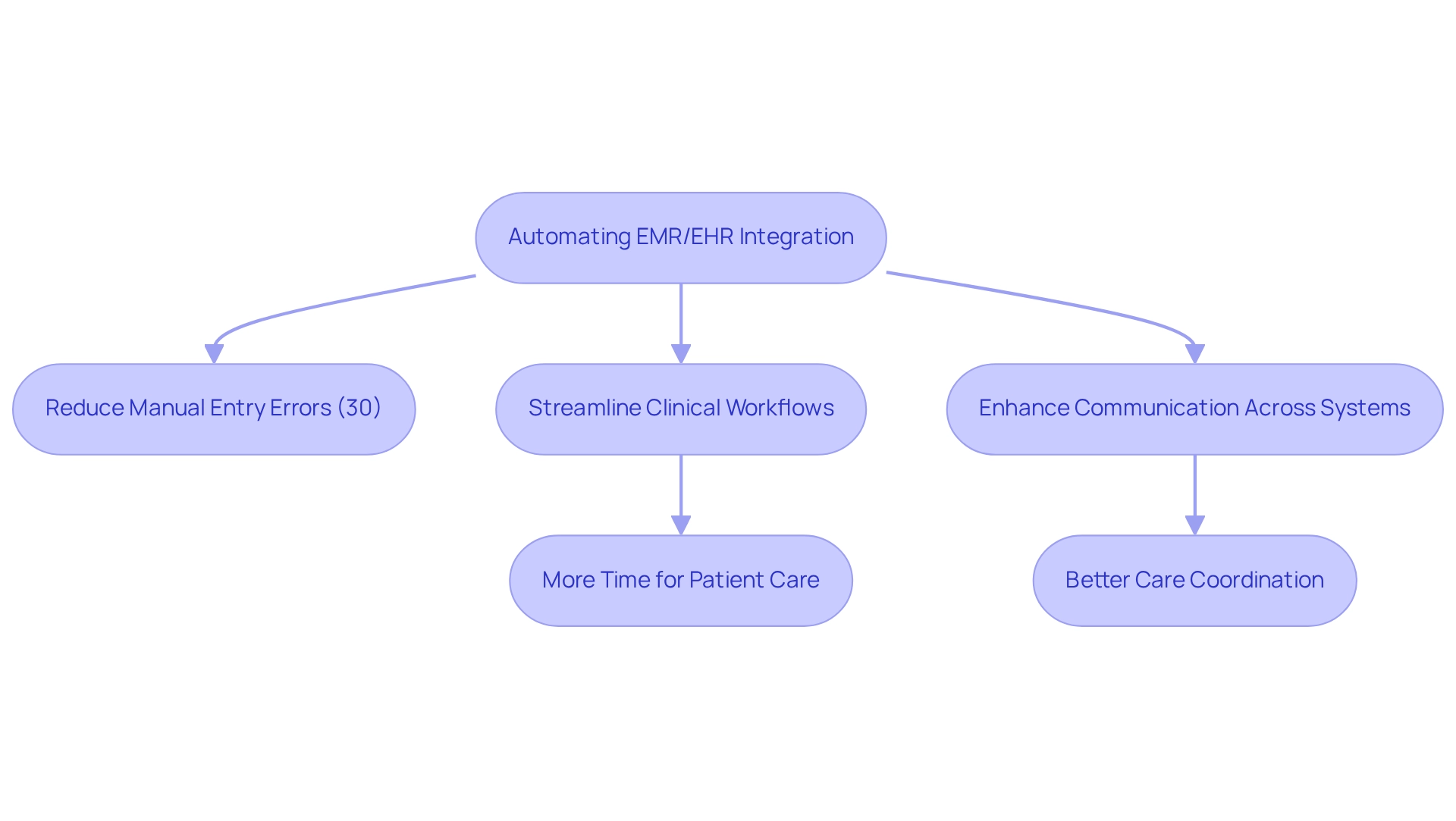
Folio3 Digital Health: Enhancing Data Accessibility in Healthcare
At Avato, we are dedicated to transforming information accessibility across medical systems, empowering providers to swiftly and effectively retrieve essential client details. Our innovative solutions, which include sophisticated information merging tools and real-time analytics systems, facilitate seamless connectivity among various medical applications by providing healthcare integration services that ensure information flows effortlessly across platforms.
This level of accessibility is vital for enhancing client outcomes, as it enables medical professionals to make informed decisions based on the most current information available, underscoring the importance of healthcare integration services for achieving seamless integration in 2025. For example, predictive modeling has demonstrated a reduction in emergency room visits by over 10% for at-risk individuals, highlighting the potential of integrated systems to improve care delivery.
Additionally, healthcare integration services enable real-time analytics to process information as it is generated, allowing medical providers to respond swiftly to urgent patient situations—a necessity in intensive care environments. Our commitment to accessibility is evident in our successful amalgamation of medical applications, which not only streamlines operations but also enhances patient information access.
By engaging stakeholders to accurately capture requirements on the first attempt and leveraging the appropriate technology, we ensure that projects are executed seamlessly. As the medical field evolves, the demand for robust healthcare integration services remains critical, enabling providers to deliver timely and effective care. Experts stress that acquiring and utilizing the digital representation of well-being is a crucial endeavor, emphasizing the ongoing need for healthcare integration services in medical coordination.
John Brownstein emphasizes the importance of a strong sourcing strategy in innovation, which is essential for focusing on impactful medical projects and ensuring that collaborative efforts yield substantial benefits for both providers and patients.
To further illustrate our impact, consider the testimonial from Tony LeBlanc of the Provincial Health Services Authority, who stated, ‘Good team. Good people to work with. Extremely professional. Extremely knowledgeable.’ This reflects the high level of skill and dedication we bring to our healthcare integration services. Moreover, by addressing FAQs regarding how we engage stakeholders and effectively employ technology, we provide clearer insights into the practical measures implemented to achieve our integration goals.
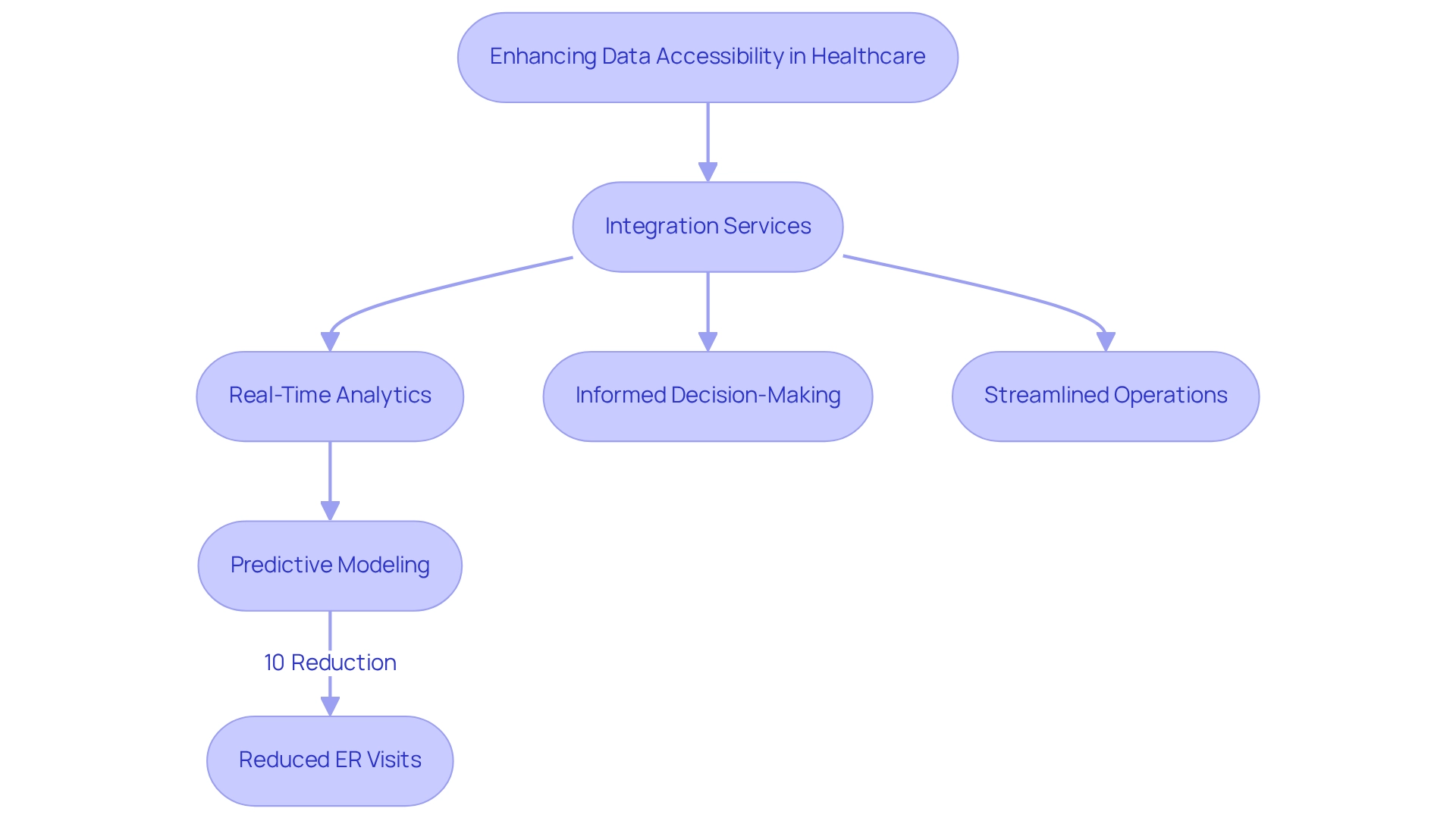
Rhapsody: Intelligent Health Data Integration Solutions
We provide healthcare integration services through smart health information unification solutions that empower medical organizations to seamlessly link various systems and applications. Founded by a dedicated team of enterprise architects, we are committed to simplifying complex integrations and maximizing the value of legacy systems. By supporting various data standards, including HL7 and FHIR, our Hybrid Integration Platform facilitates efficient data exchange and interoperability—essential components for contemporary medical service delivery. With sophisticated features such as real-time monitoring and notifications on system performance, we significantly enhance decision-making capabilities, leading to improved care outcomes.
A notable example of our impact is the partnership between Innovaccer and St. Peter’s Health, which integrated a cloud platform into care locations to optimize services and enhance care management. This collaboration illustrates how efficient incorporation, driven by our solutions, can transform medical delivery and ultimately elevate patient results.
Statistics indicate that 60% of patients who utilized telemedicine in the past year participated in at least three virtual visits, underscoring the growing reliance on unified health services. Our healthcare integration services are pivotal in facilitating these solutions, enabling medical organizations to meet the increasing demand for seamless connectivity while maximizing the value of their legacy systems and significantly reducing costs. As the medical IT unification industry evolves, we remain at the forefront of healthcare integration services, providing solutions that not only address current needs but also anticipate future demands, ensuring organizations can adapt and thrive in a rapidly changing environment. Aditi Shivarkar emphasizes the importance of healthcare integration services, asserting their necessity for managing the complexities of modern medical systems. What’s holding your team back from achieving these advancements? Join us in revolutionizing healthcare delivery.
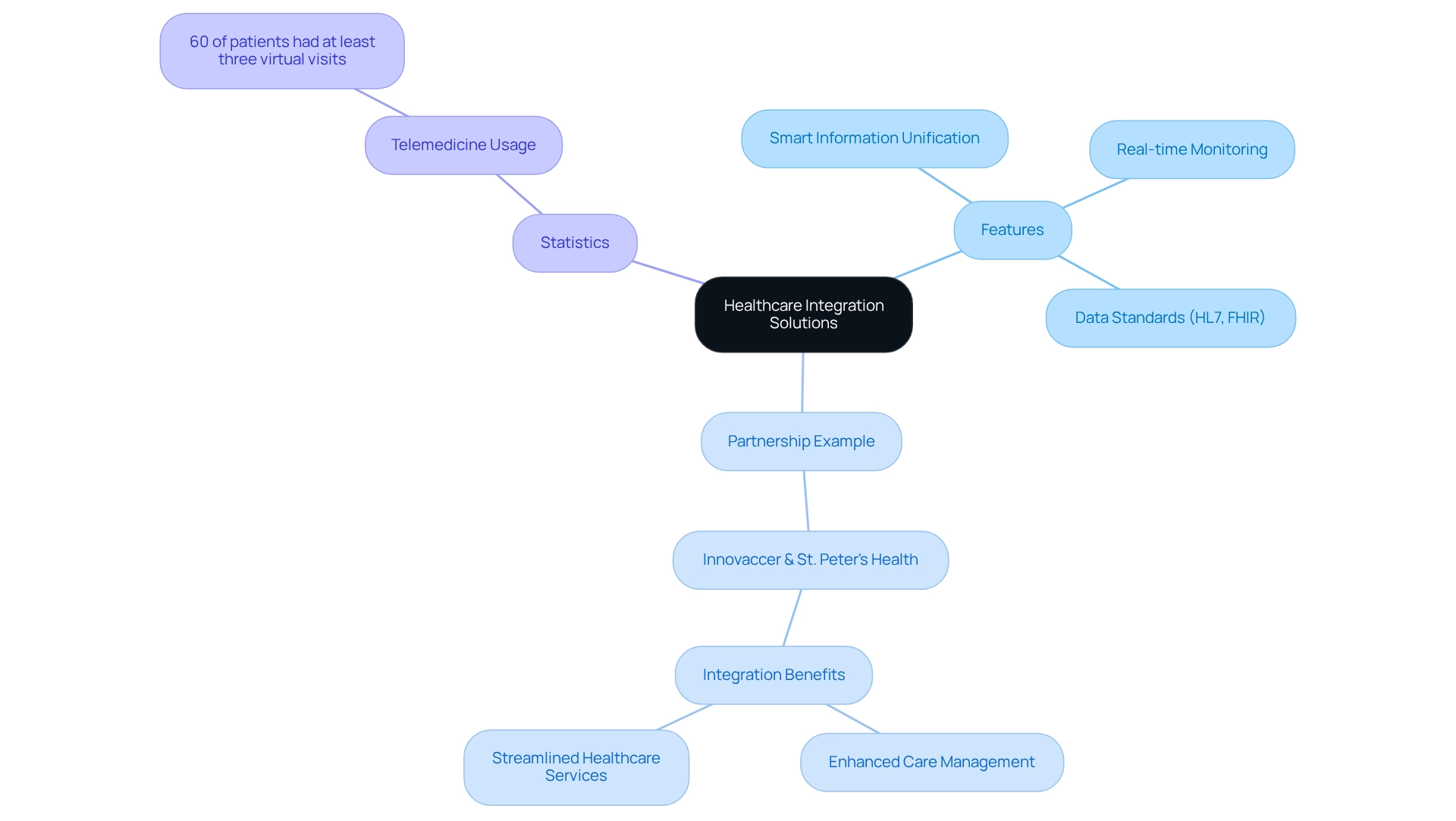
NextGen: Interoperability Solutions for Seamless Data Exchange
At NextGen, we recognize the critical importance of interoperability solutions in the medical field. Our comprehensive set of offerings incorporates healthcare integration services to enable seamless data exchange across diverse medical systems, utilizing advanced technologies and established standards to ensure secure and efficient information sharing. This capability not only enhances communication among various systems but also significantly improves healthcare integration services, which are essential for achieving optimal patient outcomes.
Looking ahead to 2025, we anticipate substantial growth in the interoperability solutions market for medical services, driven by the increasing adoption of digital health technologies. Notably, the diagnosis segment has emerged as a frontrunner in this market, underscoring the vital role of efficient information sharing in enhancing medical service delivery. Recent evaluations indicate that the diagnosis sector dominated the interoperability solutions market in 2024, reflecting a strong emphasis on improving diagnostic processes through better information unification.
Our effective implementations of interoperability solutions have demonstrated their capacity to optimize workflows and minimize administrative burdens, which are crucial for enhancing overall efficiency in the medical field. As one of our customers, Gustavo Estrada, remarked, “Avato has simplified complex projects and delivered results within desired time frames and budget constraints.” This real-world perspective highlights the practical benefits of our solutions, showcasing our commitment to architecting technology foundations that enhance business value.
Avato’s hybrid integration platform is pivotal in this landscape, offering unique features such as real-time data synchronization, robust security protocols, and seamless connectivity across various medical applications. These capabilities empower businesses to future-proof their operations and enhance service delivery.
Currently, North America holds the largest market share in medical interoperability solutions, while the Asia-Pacific region is poised for the highest growth rate. This regional perspective illustrates the varied dynamics and opportunities within the global interoperability landscape, particularly for banking IT managers looking to invest in or support medical organizations.
We understand that protecting information exchange is essential in the medical field, as it directly impacts care coordination for individuals. By ensuring that precise and prompt information is available to medical providers, our solutions contribute to enhanced decision-making and improved experiences for individuals. Our focus on security in information exchange not only safeguards sensitive patient details but also fosters trust among stakeholders in the medical ecosystem.
As the demand for healthcare integration services continues to rise, we remain at the forefront, delivering innovative interoperability solutions that meet the evolving needs of medical organizations. Our dedication to improving data sharing capabilities, combined with Avato’s groundbreaking hybrid unification platform, positions us as leaders in the sector, paving the way for a more interconnected and efficient medical system.
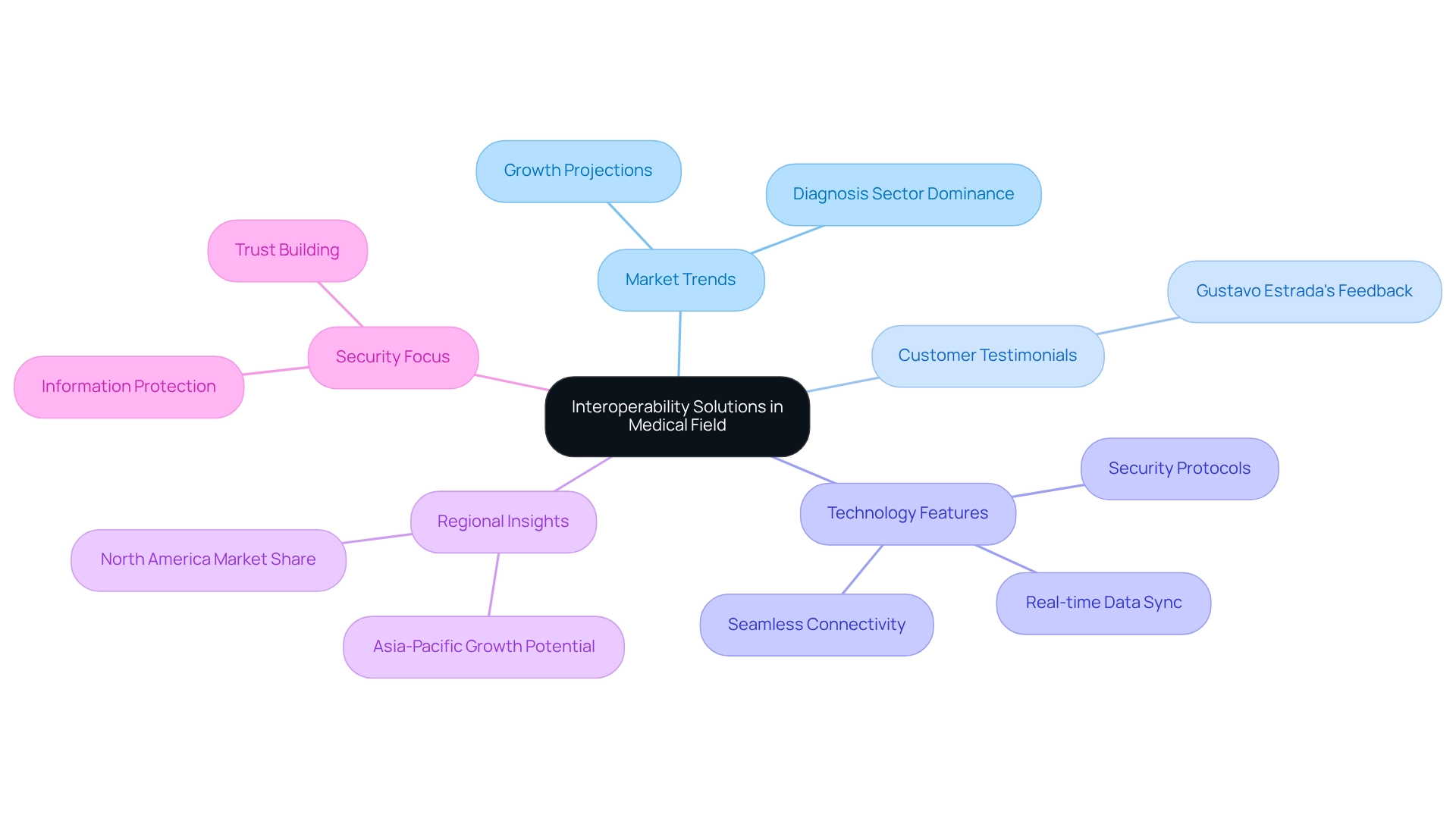
Microsoft Digital Health: Cloud Solutions for Healthcare Integration
At Microsoft Digital Health, we understand the critical role that innovative cloud-based solutions play in enhancing medical coordination and interoperability. By leveraging the power of Microsoft Azure, we empower medical organizations to utilize a scalable and secure platform that seamlessly connects diverse systems and applications. The healthcare integration services not only enhance data accessibility but also foster collaboration among medical providers, ultimately leading to more efficient and effective patient care.
As we look ahead to 2025, the medical cloud computing market in Germany is projected to command approximately 21% of the European market. This statistic reflects a robust adoption of cloud-based solutions, driven by significant investments in digitization and technological infrastructure. It underscores the importance of cloud solutions in unifying medical systems. The integration of Microsoft Azure within medical environments has proven to be successful, with numerous organizations reporting enhanced operational capabilities and improved patient outcomes.
The advantages of utilizing Microsoft Azure for medical systems are extensive. These include improved information accessibility, streamlined processes, and the ability to respond swiftly to evolving medical needs. Experts emphasize Azure’s crucial role in achieving interoperability, which is essential for contemporary healthcare integration services in medical service delivery. However, we acknowledge the value of alternative solutions, such as those offered by Avato, which has garnered praise for simplifying complex projects. Avato’s hybrid unification platform employs XSLT for efficient XML data transformation, significantly reducing programming errors and costs associated with unification projects. As Gustavo Estrada, a satisfied customer, remarked, “Avato has the ability to simplify complex projects and deliver results within desired time frames and budget constraints.”
Moreover, case studies highlight successful implementations of Azure across various medical organizations, demonstrating its effectiveness in simplifying complex healthcare integration services projects. As the medical field continues to evolve, we believe that the strategic use of Microsoft Digital Health cloud solutions will be pivotal in shaping the future of patient care and operational efficiency. For banking IT managers, comprehending these cloud solutions is essential, as they can greatly influence financial operations within medical organizations, ensuring that investments in technology align with overall business objectives.
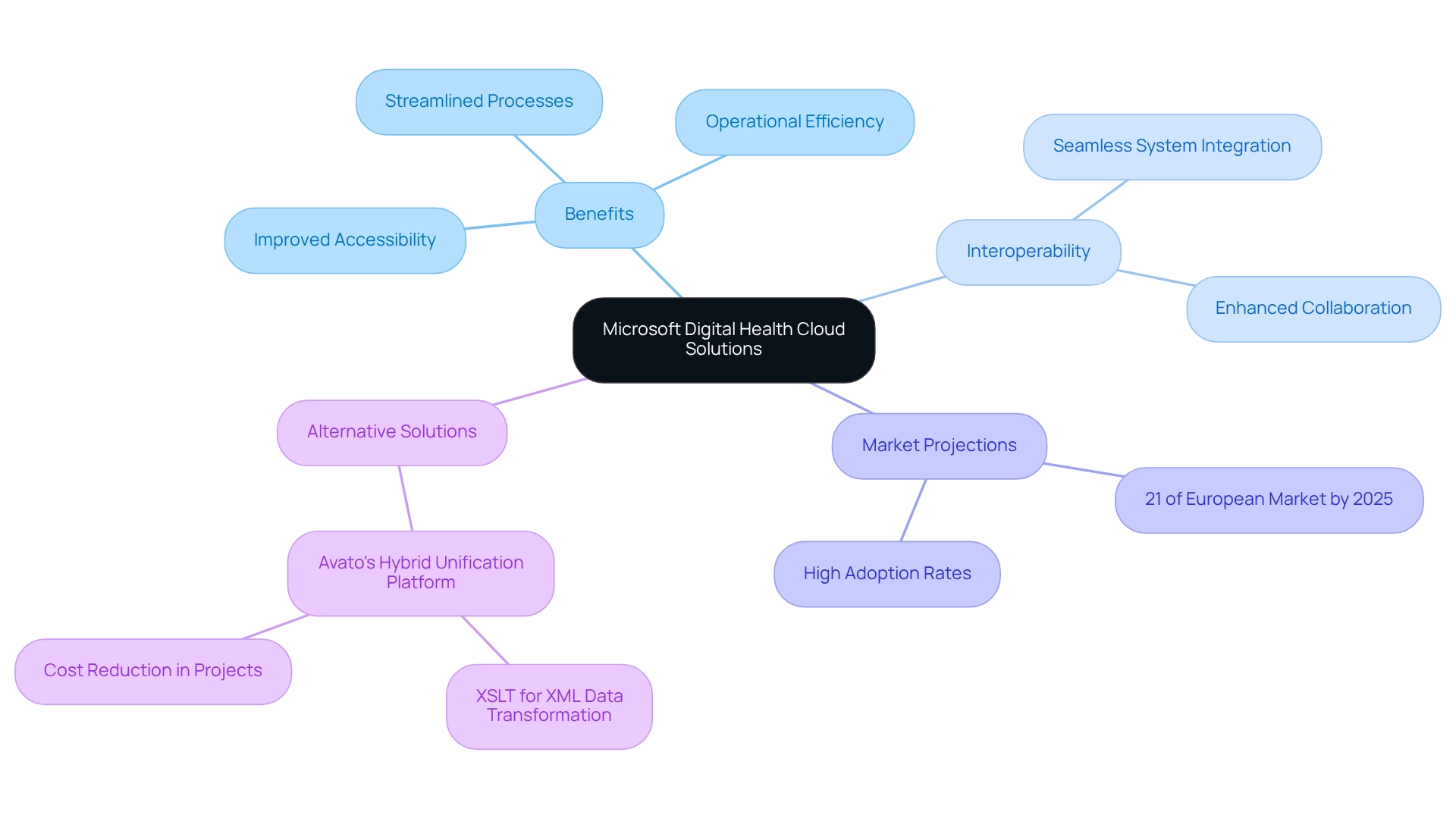
Harmony Healthcare IT: Achieving Interoperability in Healthcare
At Avato, we excel in promoting interoperability across medical systems, facilitating seamless data sharing and communication. Our innovative hybrid unification platform connects various healthcare applications, ensuring that individual information is readily accessible when needed. By prioritizing interoperability, we significantly enhance care coordination, leading to improved patient outcomes.
Our hybrid integration platform is architected for secure transactions and supports 12 levels of interface maturity, allowing organizations to balance speed of integration with the sophistication required to future-proof their technology stack. This commitment to streamlining diverse systems and improving business value is essential in the changing medical environment.
Case studies demonstrate our effectiveness in achieving interoperability. For example, a recent partnership with a significant medical provider led to a 30% decrease in patient wait times thanks to enhanced access to real-time patient information. Such outcomes emphasize the tangible advantages of efficient information sharing.
Experts emphasize that data sharing is not just a technical requirement but a fundamental aspect of modern healthcare delivery. As one industry leader remarked, “Interoperability is the backbone of effective care; without it, we cannot achieve the outcomes we aim for.” This sentiment reflects the consensus on the importance of healthcare integration services in improving patient experiences and outcomes.
Furthermore, the competitive landscape of the ambulatory EHR market illustrates the significance of interoperability solutions. As of May 2019, Epic led the market with a 33.4% share, trailed by Cerner and MEDITECH, emphasizing the necessity for effective coordination strategies to stay competitive.
At Avato, we continue to lead the charge in enhancing data sharing capabilities within medical systems, ensuring that organizations can meet the demands of a rapidly evolving landscape. Our dedication to smooth unification positions us as an essential collaborator for medical service providers seeking to improve operational efficiency and patient care quality through healthcare integration services in 2025 and beyond.
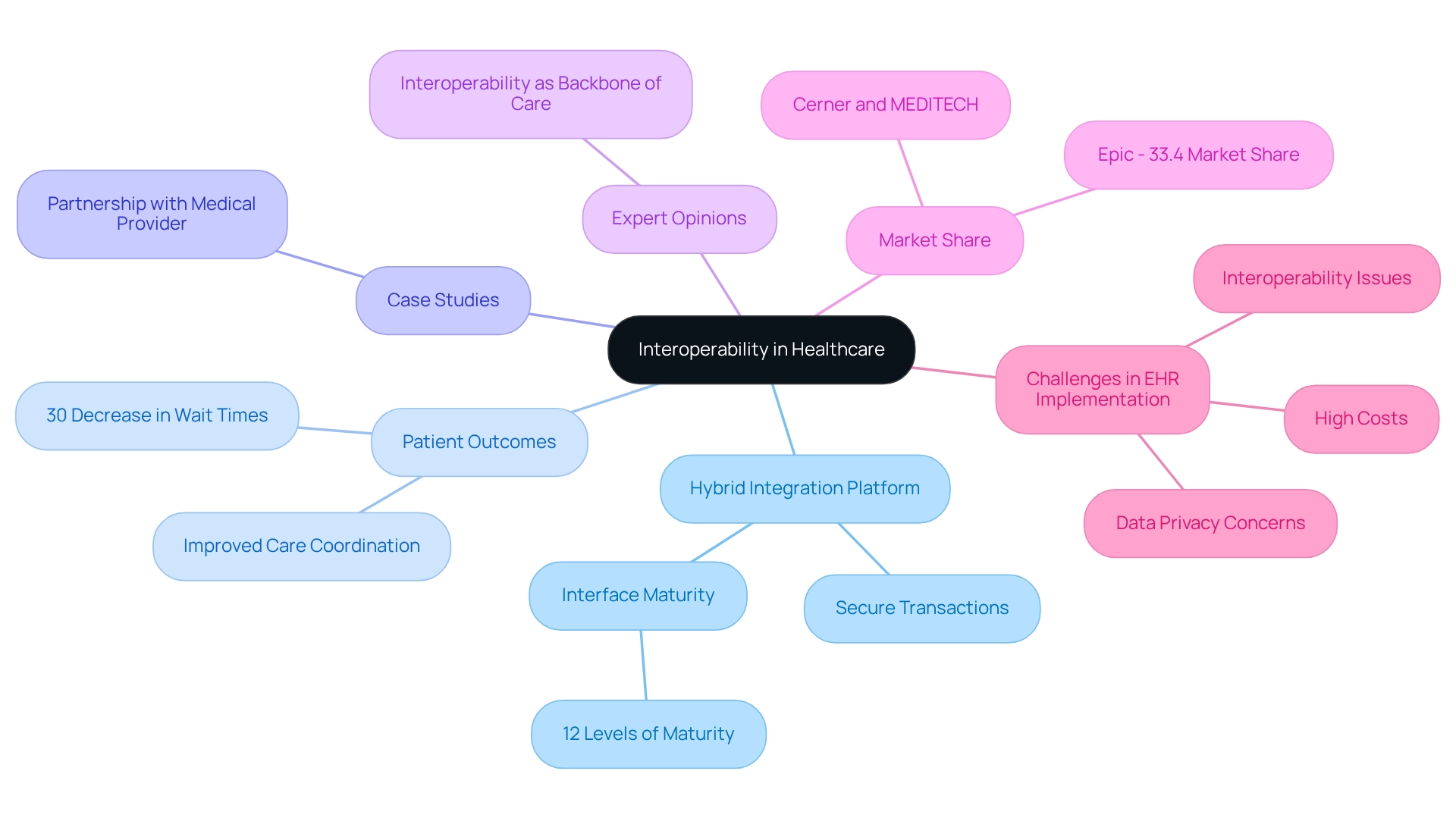
Calian: Cloud Migration and Integration Services for Healthcare
At Avato, we recognize the urgency of cloud migration and unification services tailored for medical organizations. Our Hybrid Connection Platform empowers healthcare providers to enhance and extend the value of legacy systems while simplifying complex healthcare integration services.
By leveraging our healthcare integration services, healthcare institutions can modernize their IT infrastructure, unlocking data and systems in weeks instead of months, which positions them to effectively meet the evolving demands of care. To ensure successful integration, mobilizing stakeholders is essential for accurately gathering requirements and modeling new business processes.
This strategic approach not only reduces costs but also enhances care delivery through healthcare integration services, as shown by successful implementations that have streamlined operations and improved patient outcomes. Expert insights underscore the necessity of modernizing IT infrastructure within the medical sector to remain competitive in a rapidly changing landscape, emphasizing that adopting cloud technologies is critical for achieving scalable and equitable medical solutions.
Moreover, we differentiate ourselves by delivering unparalleled value through speed, security, and simplicity in healthcare integration services, which are crucial elements for healthcare organizations. With the average cost of a data breach in the cloud reaching $3.86 million, the importance of secure cloud solutions cannot be overstated.
As Sara Vaezy aptly noted, it’s less about merely adapting to the pandemic and more about leveraging our insights to advance the health system’s mission to serve all patients more effectively, scalably, and equitably. This perspective highlights the imperative for medical systems to innovate beyond traditional practices to reduce costs and enhance care.
What’s holding your team back from embracing this transformation?
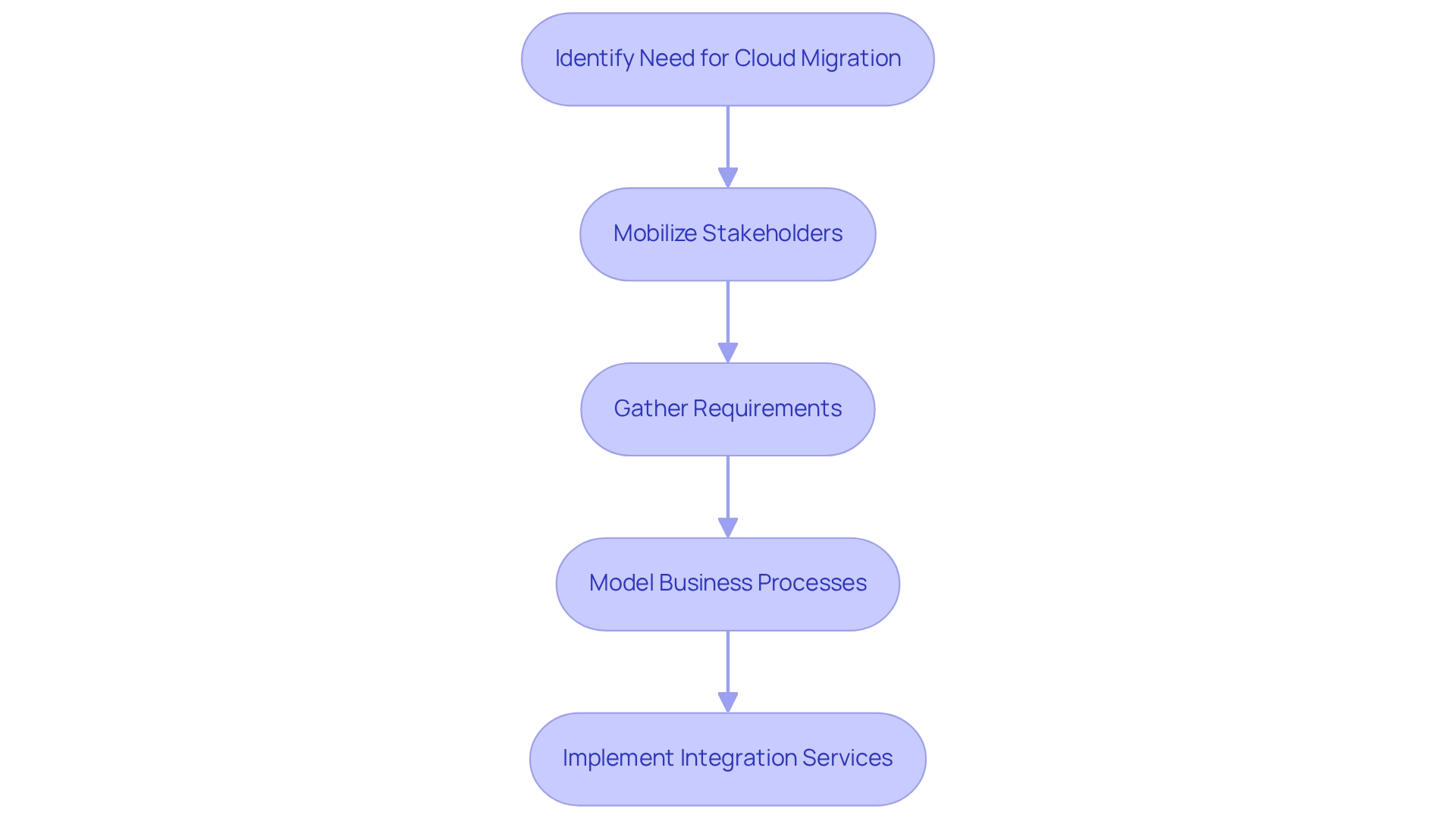
OSPLabs: Integrated Healthcare Solutions for Improved Care Delivery
We excel in delivering healthcare integration services that unify diverse systems and applications within medical organizations. By ensuring that medical providers have access to complete client information, we significantly enhance care delivery. The seamless incorporation of healthcare integration services not only improves operational efficiency but also aids in achieving better outcomes for individuals, establishing us as an indispensable ally for medical institutions.
In 2025, the emphasis on unified solutions is more essential than ever. Medical providers have reported engaging with individuals 50-175 times more during virtual visits since the pandemic. This shift highlights the importance of strong healthcare integration services to effectively manage heightened user interactions—a requirement that we meet through our innovative solutions. Our dedication to enhancing care delivery is evident in our successful implementations of healthcare integration services across various medical organizations. These healthcare integration services streamline processes, reduce costs, and enhance the quality of care.
For instance, the increase in medical e-commerce has enabled organizations to obtain medical supplies more easily, leading to reduced costs and a wider selection of products, ultimately enhancing care for individuals. Specific results from these implementations demonstrate considerable advancements in procurement efficiency and patient satisfaction.
As the medical landscape evolves, we remain at the forefront, utilizing innovations like blockchain technology to improve data interoperability. This focus on significant projects, as highlighted by John Brownstein, rather than temporary trends, positions us as leaders in integrated medical solutions. Furthermore, Gustavo Estrada’s remark that we streamline intricate projects highlights the essential function of our healthcare integration services within the hybrid integration platform in the medical field, ensuring that providers can adapt to evolving requirements while upholding high standards of care.
Our commitment to architecting technology foundations empowers healthcare institutions to create connected customer experiences, transforming unstructured information into structured requirements models that support digital transformation initiatives.
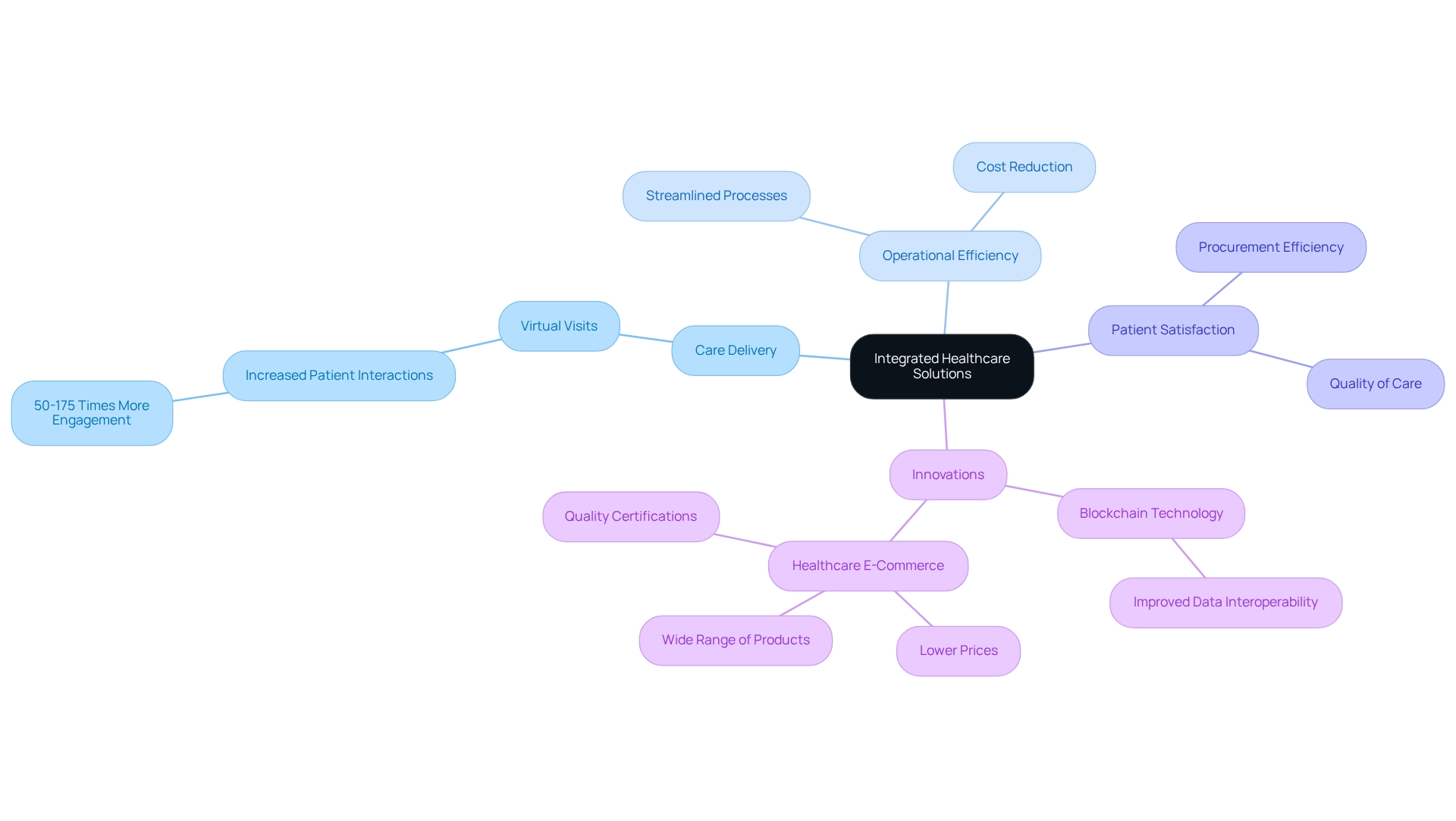
Conclusion
In the contemporary healthcare landscape, we cannot overstate the significance of seamless data integration. Platforms like Avato, Mirth Connect, and Clarity Connect play a pivotal role in bridging the gaps between disparate systems, ultimately enhancing patient care and operational efficiency. These integration solutions empower us to streamline complex workflows, reduce manual errors, and ensure that critical patient information is accessible when needed.
Avato’s hybrid integration platform stands out for its ability to support secure and efficient connections that adhere to strict regulatory requirements. Meanwhile, Mirth Connect enhances interoperability through its open-source capabilities, significantly improving data management and clinical workflows. Clarity Connect further complements these efforts by automating EMR and EHR integrations, leading to better care coordination and improved patient outcomes.
As healthcare continues to evolve, the demand for effective data integration solutions will only grow. The implementation of advanced technologies and the adoption of standards like FHIR are crucial for enabling robust data exchange. Moreover, with the increasing reliance on digital health technologies, we must prioritize interoperability to remain competitive in this rapidly changing environment.
Ultimately, investing in these integration solutions is not just about keeping pace with technological advancements; it is about transforming healthcare delivery to provide superior patient care. By embracing these innovative platforms, we can navigate the complexities of modern healthcare, ensuring that we are well-equipped to meet the demands of tomorrow. The journey towards improved healthcare integration is ongoing, and our commitment to leveraging these capabilities will yield significant benefits for both providers and patients alike.

